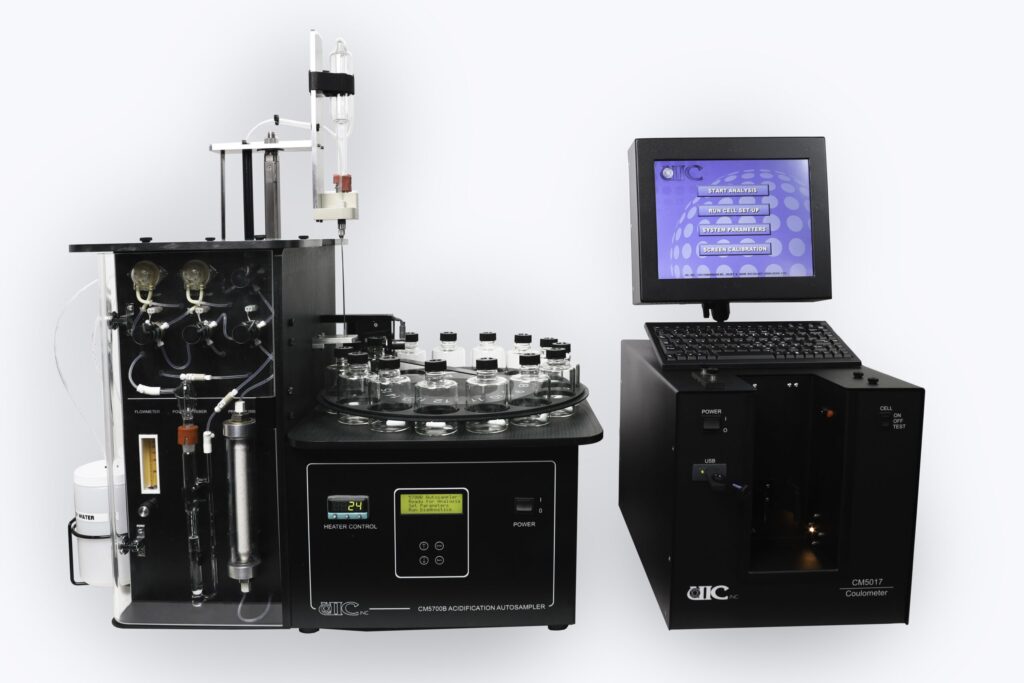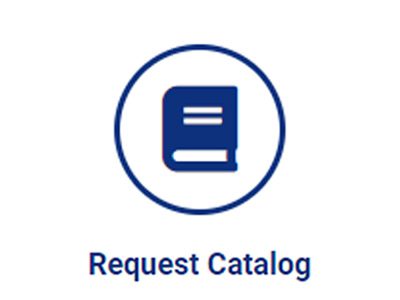CM245 Carbon Analysis TIC By COULOMETRIC DETECTION, Automated Acidification
CONFORMS TO ASTM D 513
The CM245 Carbon Analyzer is an analytical system capable of measuring total inorganic carbon in liquid and solid samples. Combining a self-contained acidification module and a highly sensitive CO2 detector, the CM245 offers the flexibility to analyze most any sample type and concentration with a precision un-matched by other analytical techniques. The CM245 system includes the following components pictured above:
CM5017 CO2 Coulometer
| CM5700B Autoacidification unit • 15-position carousel with 80 ml flasks or 30-position carousel with 20 ml flasks |
Instrument Capabilities
A major advantage of the CM245 Carbon Analyzer is the use of coulometric detection. Employing the principles of Faraday’s Law, the CM5017 CO2 Coulometer automatically measures the absolute mass amount of carbon dioxide resulting from sample combustion or acidification.
No user-calibration is required and linear detection is available from less than 1 µg carbon to over 10,000 µg carbon. Using this 100% efficient coulometric process, relative standard deviations of 0.2% or better are common for standard material. For smaller concentrations, an absolute deviation of approximately 1 µg C is typical.
Total Inorganic Carbon (TIC)
Liquid or solid samples are placed in 80 ml sample flasks, which are then loaded into a 15-position carousel. Plastic lids with silicone septa are used to tightly close sample flasks. As the carousel rotates, sample flask is lowered into a heating well where stirring and heating (optional) are introduced. Arm holding inlet and outlet needles lowers and the needles penetrate the septum of the sample flask. Once purged, the measurement starts, and acid is pumped through the long (inlet) needle into the sample flask. Carrier gas enters the flask through the long needle and leaves together with any evolved gasses through the short (outlet) needle. Thereafter, carrier gas goes though post-scrubber to remove potential interferences and ultimately into the reaction cell of a CM5017 CO2 or CM5017S coulometer, where inorganic carbon evolved as CO2 (or sulfur as SO2) is automatically measured by a 100% efficient coulometric titration. Heat (up to 180 ◦C) can be used for the more efficient digestion of difficult samples.
Data Handling
Names, weights and sizes of up to 15 samples can be entered, to be used by the CM5017 in calculating the final result. Analytical progress is displayed on the 10” LCD touch screen in user-selectable units. Detailed analysis information is automatically saved to an on-board SD card after each sample. Data can also be transmitted through the standard serial and Ethernet ports to be captured on a personal computer or LIMS. In addition, a detailed report can be printed to the optional small format printer while each sample is running.
Ordering Information
CM245 – TIC Auto-Analyzer
Includes: CM5017 CO2 Coulometer, CM5700B Auto-Acidification Module with tools and accessories. (P/N CM250-01 110V, 50/60Hz) (P/N CM250-02 220V, 50/60Hz)
Optional Equipment:
Printer – 3” format impact printer. Includes cable, power supply, paper and ribbon. (P/N CM124078)





